江苏省锡山高级中学 高二下 英语 选修八语法(省略)(答案不全)
选修八第三单元语法grammar
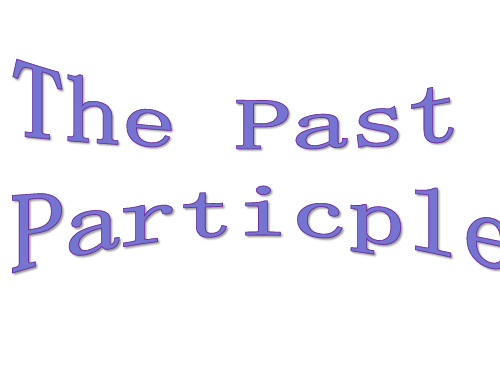
2.作用---相当于一个定语从句
(1)Is there anythin Nhomakorabea planned for tonight ? =Is there anything that has been planned for tonight?
(2)The book, written in1957, tells the struggle of the miners. =The book, which was written in 1957, tells the struggle of the miners.
1.位置: 单个分词位于名词前,短语则在名词后, 被过去分词所修饰的名词,就是该分词的逻辑 主语。 The stolen car was found by the police last week. The speaker answered all the questions raised by the audience.
I saw her coming into the classroom.
I saw her taken out of the classroom.
3. 使役动词: make, get, have, keep ,leave, etc. e.g. We must get the table cloth washed. = We must ask somebody to wash the table cloth. He had his watch repaired. 4.在“with / without+宾语+宾补(过去分 词)”这一结构中,过去分词与宾语之间是动 宾关系。 e.g. Do you know the man with his hair tied back?
高中英语选修八:M8U2 Grammar省略 课件

What is Ellipsis?
Some words can be left out when we do not want to repeat them. This is called
ellipsis.
Ellipsis is used
when we do not want to repeat words or phrases that m afraid, I think, I believe, I hope, I guess, I expect, I suppose, I imagine等开头的作答句中, 后面跟so 与 not 分别用于肯定或否定,宾语从句可省去。
a. —Do you believe our team will win? —I guess so (your team will win). —I guess not (your team will not win).
Some words of a sentence can be left out while the meaning can still be understood.
• 1. My father likes sports more than Tom. (wrong)
• 2. My father likes sports more than Tom does. (correct)
The bringing together of the group of people from many countries, the music and the setting (were the key components for the production of this opera).
如:Mary can (speak English)and (Mary) ought to speak English.
高二英语省略强化练习题30题含答案解析
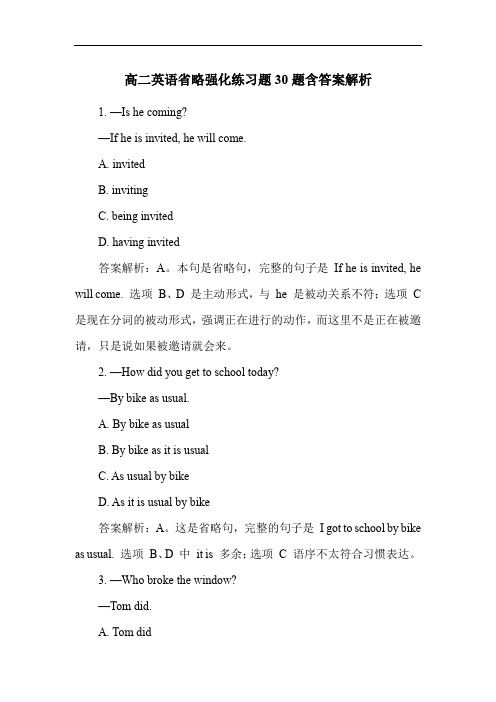
高二英语省略强化练习题30题含答案解析1. —Is he coming?—If he is invited, he will come.A. invitedB. invitingC. being invitedD. having invited答案解析:A。
本句是省略句,完整的句子是If he is invited, he will come. 选项B、D 是主动形式,与he 是被动关系不符;选项C 是现在分词的被动形式,强调正在进行的动作,而这里不是正在被邀请,只是说如果被邀请就会来。
2. —How did you get to school today?—By bike as usual.A. By bike as usualB. By bike as it is usualC. As usual by bikeD. As it is usual by bike答案解析:A。
这是省略句,完整的句子是I got to school by bike as usual. 选项B、D 中it is 多余;选项C 语序不太符合习惯表达。
3. —Who broke the window?—Tom did.A. Tom didB. Tom wasC. Tom hasD. Tom does答案解析:A。
这里是省略句,完整的句子是Tom broke the window. 因为问句用的是一般过去时,所以回答也用一般过去时did 来代替broke the window。
选项B、C、D 时态不对。
4. —Will you go to the party?—If I have time, I will go.A. have timeB. having timeC. am having timeD. had time答案解析:A。
这是省略句,完整的句子是If I have time, I will go. 选项B 是现在分词形式,不能单独作谓语;选项C 是现在进行时,与语境不符;选项D 是过去时,不符合条件。
高中英语选修8参考答案

高中英语选修8参考答案Unit 1: Festivals Around the WorldReading Comprehension1. T F F T F2. (a) Lantern Festival, (b) Thanksgiving Day, (c) Christmas,(d) Easter, (e) Mid-Autumn FestivalVocabulary and Grammar1. (a) celebrate, (b) traditional, (c) customs, (d) decorate,(e) symbolize2. (a) What do you usually do on the Spring Festival? (b) When does the Dragon Boat Festival take place? (c) Why do people eat mooncakes during the Mid-Autumn Festival? (d) What is the significance of the lanterns in the Lantern Festival?Language Points- "celebrate" 作为动词,表示庆祝。
- "traditional" 形容词,表示传统的。
- "customs" 名词复数,表示风俗习惯。
- "decorate" 动词,表示装饰。
- "symbolize" 动词,表示象征。
Unit 2: Heroes and Role ModelsReading Comprehension1. F T F T T2. (a) Florence Nightingale, (b) Martin Luther King Jr., (c)Mahatma Gandhi, (d) Nelson Mandela, (e) Mother TeresaVocabulary and Grammar1. (a) inspire, (b) leader, (c) sacrifice, (d) movement, (e) contribute2. (a) Who inspired you to become a teacher? (b) What did Martin Luther King Jr. lead? (c) What sacrifices did Mahatma Gandhi make for India's independence? (d) To what cause did Mother Teresa contribute?Language Points- "inspire" 动词,表示激励。
江苏省包场高级中学高中英语选修八 M8 U2 Grammar 学

M8 U2 Grammar --- 省略练习1.The man we followed suddenly stopped and looked as if______whether he was going in the right direction.A.seeingB.havingC.to have seenD.to see2.Meeting my uncle after all these years was an unforgettable moment,______ I will always treasure.A.thatB.oneC.itD.what3.I often think of my childhood,during________I lived on my uncle’s farm.A.whichB.whenC.whereD.who4.—May I help you with some shoes,sir? —Yes,I’d like to try on those white ______.A.oneB.onesC.twoD.pair5.Here are four choices,which do you think is the best________?A.choicesB.thatC.onesD./6.—What’s the difference between the first house and the second?—The first one has a garage while the second has ________.A.nothingB.noneC.no oneD.neither7.—Have you ever been to Shanghai? —________.A.Not yetB.Haven’tC.Yet notD.Still not8.—Don’t forget to come to my birthday party.—________.A.I don’tB.I won’tC.I don’t forgetD.I won’t forget9.—Be sure to get up earlier tomorrow morning. —________.I’ll be as early asa bird.A.OK.I willB.I’m afraid 1 canC.Of course notD.No,I will10.—What’s the matter with you?—I didn’t pass the test,but 1 still ________A.hope soB.hope toC.hope itD.hope that11.—Is she really ill? —________.She’s in hospital.A.I hope soB.I’m sureC.1 don’t think soD.I’m afraid so12.I will be happy if you ________.A.happyB.areC.willD.be13.—I say it is your turn to be on duty today. —________?A.MineB.IC.MyselfD.Me14.Don’t come in unless ________.A.invitingB.inviting toC.invited toD.being invited to15.—I usually go there by train. —Why not ________by boat for a change?A.to try goingB.try to goC.to try and goD.try going16.The doctor did what he could ________the boy,but in vain.A.saveB.to saveC.savingD.saved17.He spent most of his spare time________novels.A.to readB.readingC.to readingD.for reading18.All the girl want ________do is________stay at home and study hard.A./;toB.to;toC.to;/D.either B or C19.—Why did you take a taxi? —I ________.I was late.A.have toB.have to doC.had toD.had to do20.—Why didn’t you do your homework yesterday?—But ________,sir.A.I did soB.I didn’t do itC.I didn’t forgetD.I did do it21.He is very famous here,so we had no trouble________him yesterday.A.to findB.findingC.foundD.in founding22.—How often do they give the concert? —________.A.For twice a monthB.In twice a monthC.Twice a monthD.Twice month23.He is not ________his sister,but ________.A.taller than;strongerB.so tall as;strongC.taller than;is strongerD.as tall as;stronger24.—You look happy today,Mary.—I like my new dress and Mother ________,too.A.likesB.doesC.isD.do25.—What do you think made Mary so upset?—________ her new bicycle.A.As she lostB.LostC.LosingD.Because of losing26.—Who’s got all my money?—He ________.A.doesB.isC.wasD.has27.The children are made________twelve hours a day.A.to workB.workC.workingD.worked28.We often hear him________English songs.A.to singB.singC.singingD.to be singing29.I’m very busy preparing for the exam,so I can’t help________the house work.A.doingB.doC.didD.done30.What doctors can do is________ people’s life.A.saveB.savingC.to saveD.A or C31.Although________to stop,he kept on working.A.tellB.toldC.was toldD.having told32.Ask him to take you home________possible.A.atB.whileC.ifD.if they33.The English book for kids is the best of its kind ________.A.that has ever been madeB.ever madeC.ever been madeD.has ever been made34.—Will Susan win the Nobel Prize this time? —It is likely that she ________.A.willB.doesC.will doD.wins it35.I prefer the climate of Kunming to________of Wuhan.A.itB.oneC.thisD.that36.—Mr.Black has just arrived. —Really? _______.He didn’t accept our invitation.A.I can’t imagine itB.1 don’t think soC.I hope soD.I don’t believe him37.They live on a busy main road.________ must be very noisy.A.ThereB.ItC.ThatD.They38.We don’t go to the cinema as much as ________.A.we used to goB.we used to doed toD.we used to39.Canada has a large area than________China.A.that ofB.the one ofC.it ofD./40.________,I’ll have a letter sent to your company.A.If necessaryB.If it were necessaryC.As I’m necessaryD.Unless it is necessary41.—Shall I invite Mike to my party? —Yes,it will be nice if you ________.A.doB.do inviteC.areD.invite42. In our class Mary’s English is better than ______.A. anybody elseB. anybody’s EnglishC. anybody else’D. anybody else’s43.—Do you follow me? —Yes,________.A.it is goodB.I willC.perfectlyD.very good44.Look out for cars________the street.A.when crossedB.when crossingC.if you crossedD.while are crossing45.She worked very hard________still rather poor in health.A.though sheB.although sheC.thoughD.although was46.—Is the stamp very unusual? —________.A.Yes,very muchB.Yes,it is soC.Yes,veryD.Yes,not very47.—Can you climb that tree,my boy? —________?A.IB.MineC.MyselfD.Me48.—Will you waste your time and money on that? —Certainly ________.A.I notB.noC.won’tD.not49.—What happened to the boy? He’s making so much noise.—He wanted to play football,but his mother warned him ________.A.notB.toC.not toD.不填50.—Shall I wake you up tomorrow morning?—Yes,________.A.please doB.you shallC.you willD.you may51.When ____, the building will be used as a school for children from poor families.A. completedB. completingC. to be completedD. is completing52.The twins are different in appearance but _____in characteristics.A. notB. noC. aren’tD. don’t.53.—Alice,why didn’t you do it the day before?—I ________,but I had an unexpected visitor.A.hadB.wouldC.was going toD.does54.---Mary is not coming tonight. ---But she ______.A.promisesB.promisedC.will promiseD.had promised55.—Are you a film star? —________.A.Yes,I wasB.I used to beC.I used toD.I’m used to56.—I’ll be away on a business trip. Would you mind looking after my cat?—Not at all.________.A.I’ve no timeB.I’d rather notC.I’d like itD.I’d be happy to57.—I’m going to dig it up.—What ________?A.withB.byC.atD.from58.Frightened by the noise in the night,the girl did not dare ________in her room.A.sleepingB.to sleepingC.sleepD.slept59.—They have done a good job. —________.Let’s go to congratulate them.A.So they have doneB.So they haveC.So have theyD.So is it60.He smokes a lot.Does his father ________?A.smoke soB.smoke thatC.do soD.did that61. John plays football ______,if not better than, David.A.as wellB.as well asC.so wellD.so well as62. ---Will you go home tomorrow evening ?---No. I am going to a lecture,or at least I am planning _____.A.itB.onC.soD.to63. If th e weather is fine,I’ll wash my clothes.If _____,______.A.not; notB.no; noC.not; noD.no; not64.____ green ,the door might look more beautiful.A.You paintedB.If paintedC.To paintD.Have it painted65.What surprised me was not what he said but ____ he said it.A.the wayB.in the way thatC.in the wayD.the waywhich66.---You should have given them some advice. --- ______.But who care what I offered ?A.So it wasB.So I shouldC.So I didD.So should you67.—I would never come to this restaurant again. The food here is terrible! --- _____.A.Nor am IB.Neither would IC.Same with meD.So do I68. --- She’s not an English teacher,is she ? --- ______.A.Yes, and she isn’tB.Yes, but she wasC.No, but she isn’tD.No, but she was69.The teacher told us to remain silent unless ________.A.to be askedB.being askedC.askedD.you asked70. ---Who has been planning the summer camp ? ---Everyone in the class ____.A.isB.haveC.hasD.are71.---You should have thanked her before you left .---I meant _____, but I couldn’t find here anywhere when I was leaving.A.to doB.toC.doingD.doing so72.______it snow tomorrow, we would have to put off the visit to the Yangpu Bridge.A.WereB.ShouldC.WouldD.Will73.I ______and will never ask such a silly question.A.have neverB.neverC.have askedD.have never asked74.---Did Jane pick up some Russian when she was on business abroad? ---I imagine ____.A.thatB.she wasC.soD.it75.---Everyone says you are a good employee.Y ou never make a mistake, do you ? ---_______ .A.Yes, neverB.Yes, sometimesC.No, sometimesD.Oh, really76.One of the sides of the paper should be painted yellow, and ______.A.the other is whiteB.another whiteC.the other whiteD.another is whiteM8 U2 Grammar --- 省略练习答案1~5 DBABD 6~10 BABAB 11~15 DBACD 16~20 BBDCD 21~25 BCABC 26~30 DABBD 31~35 BCBAD 36~40 ABDDA 41~45 ADCBC 46~50 CDDCA51~55 AACBB 56~60 DACBC 61-65 BDABA 66-70 CBDCC 71-76BBDCBCM8 U2 Grammar --- 省略练习答案1~5 DBABD 6~10 BABAB 11~15 DBACD 16~20 BBDCD 21~25 BCABC 26~30 DABBD 31~35 BCBAD 36~40 ABDDA 41~45 ADCBC 46~50 CDDCA51~55 AACBB 56~60 DACBC 61-65 BDABA 66-70 CBDCC 71-76BBDCBCM8 U2 Grammar --- 省略练习答案1~5 DBABD 6~10 BABAB 11~15 DBACD 16~20 BBDCD 21~25 BCABC 26~30 DABBD 31~35 BCBAD 36~40 ABDDA 41~45 ADCBC 46~50 CDDCA51~55 AACBB 56~60 DACBC 61-65 BDABA 66-70 CBDCC 71-76BBDCBCM8 U2 Grammar --- 省略练习答案1~5 DBABD 6~10 BABAB 11~15 DBACD 16~20 BBDCD 21~25 BCABC 26~30 DABBD 31~35 BCBAD 36~40 ABDDA 41~45 ADCBC 46~50 CDDCA51~55 AACBB 56~60 DACBC 61-65 BDABA 66-70 CBDCC 71-76BBDCBCM8 U2 Grammar --- 省略练习答案1~5 DBABD 6~10 BABAB 11~15 DBACD 16~20 BBDCD 21~25 BCABC 26~30 DABBD 31~35 BCBAD 36~40 ABDDA 41~45 ADCBC 46~50 CDDCA51~55 AACBB 56~60 DACBC 61-65 BDABA 66-70 CBDCC 71-76BBDCBCM8 U2 Grammar --- 省略练习答案1~5 DBABD 6~10 BABAB 11~15 DBACD 16~20 BBDCD 21~25 BCABC26~30 DABBD 31~35 BCBAD 36~40 ABDDA 41~45 ADCBC 46~50 CDDCA51~55 AACBB 56~60 DACBC 61-65 BDABA 66-70 CBDCC 71-76BBDCBCM8 U2 Grammar --- 省略练习答案1~5 DBABD 6~10 BABAB 11~15 DBACD 16~20 BBDCD 21~25 BCABC 26~30 DABBD 31~35 BCBAD 36~40 ABDDA 41~45 ADCBC 46~50 CDDCA51~55 AACBB 56~60 DACBC 61-65 BDABA 66-70 CBDCC 71-76BBDCBCM8 U2 Grammar --- 省略练习答案1~5 DBABD 6~10 BABAB 11~15 DBACD 16~20 BBDCD 21~25 BCABC 26~30 DABBD 31~35 BCBAD 36~40 ABDDA 41~45 ADCBC 46~50 CDDCA51~55 AACBB 56~60 DACBC 61-65 BDABA 66-70 CBDCC 71-76BBDCBC。
高二英语选修8学案:省略、替代和插入语含解析

名师集思广益插入语小结句中的插入语通常用一个逗号把它与句子隔开,其位置可在句首、句中或句末。
其作用是对某一个词、词组或对一个句子做些附加的解释和说明,或在两句之间起连结作用。
可以用作插入语的有:不定式、分词、副词、介词短语和句子等.下面就插入语这一语法现象逐一举例说明:1)不定式To be frank/honest,that’s a very useful dictionary。
老实说,那是一本很有用的词典。
Once I nearly posted it to the USA,but,to tell you the truth,I didn’t want to spend money on a stamp。
有一次我差点把它寄到美国去,实话告诉你,我是不愿花钱买邮票。
But I think we’ll have to give him a shot,just to be safe.但是,我认为为了安全起见,还得给他一枪。
2)分词Generally speaking,the weather in Shenzhen is neither too cold in winter nor too hot in summer.一般来说,深圳的气候冬天不太冷,夏天不太热。
Judging from/by his accent,he may be from Scotland.从他的口音判断,他可能来自苏格兰.3)介词短语Americans eat a lot of meat,too much in my opinion。
美国人吃肉食多,依我看是太多了.Do not plant,for example,rice year after year in the same field.例如,在同一块地里,不要年复一年地种稻谷。
By the way,Bob sends his best wishes。
顺便说一下,鲍勃问候你好。
高二英语人教版选修8unit3Section ⅢGrammar精讲精练(含答案)

Section ⅢGrammar——过去分词作定语、表语和宾语补足语考点一过去分词作定语1.过去分词作定语时,相当于形容词,其逻辑主语就是它所修饰的名词。
分词所表示的动作与其所修饰的名词构成动宾关系。
The concert given by their friends was a success.他们朋友举办的音乐会很成功。
2.单个的过去分词作定语时,常常置于其所修饰的名词前;而过去分词短语作定语时,常常置于其所修饰的名词后。
They are cleaning the fallen leaves in the yard.他们正在打扫院子里的落叶。
The meeting,attended by over five thousand people,welcomed the great hero.(他们举行了)欢迎英雄的大会,到会的有五千多人。
3.过去分词及过去分词短语作定语一般可转换为一个定语从句。
We must adapt our regulations to the changed conditions.=We must adapt our regulations to the conditions that have been changed.我们必须调整规章制度来适应变化了的情况。
4.有些过去分词作前置定语与后置定语时意义不同。
in the given time在既定的时间内with the words given用所给的单词a concerned look一个关切的神情the people concerned有关人士[名师点津]及物动词的过去分词除表示“完成”的动作之外,还表示“被动”的意义。
如:spoken English(英语口语);iced beer(冰冻啤酒);cooked food(熟食);fried chips(炸土豆条)。
不及物动词的过去分词常表示“完成”的动作,而不表示“被动”意义。
江苏省锡山高级中学2024届八年级英语第二学期期末教学质量检测模拟试题含答案
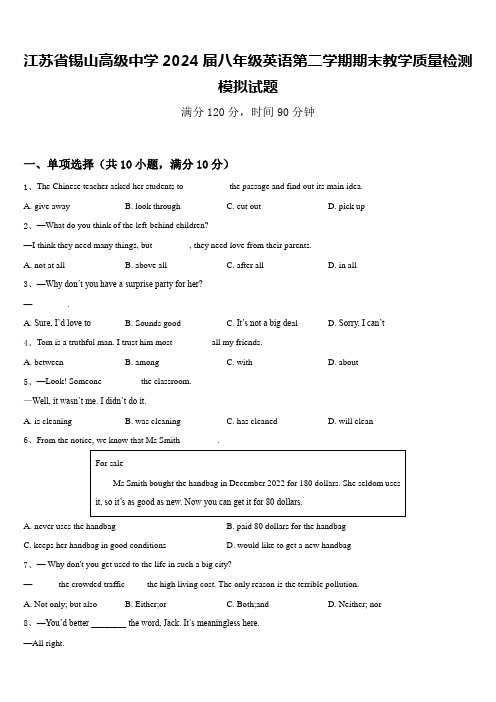
江苏省锡山高级中学2024届八年级英语第二学期期末教学质量检测模拟试题满分120分,时间90分钟一、单项选择(共10小题,满分10分)1、The Chinese teacher asked her students to __________the passage and find out its main idea.A. give awayB. look throughC. cut outD. pick up2、—What do you think of the left-behind children?—I think they need many things, but ________, they need love from their parents.A. not at allB. above allC. after allD. in all3、—Why don’t you have a surprise party for her?—________.A. Sure, I’d love toB. Sounds goodC. It’s not a big de alD. Sorry, I can’t4、Tom is a truthful man. I trust him most ________ all my friends.A. betweenB. amongC. withD. about5、—Look! Someone ________ the classroom.—Well, it wasn’t me. I didn’t do it.A. is cleaningB. was cleaningC. has cleanedD. will clean6、From the notice, we know that Ms Smith ________.A. never uses the handbagB. paid 80 dollars for the handbagC. keeps her handbag in good conditionsD. would like to get a new handbag7、— Why don't you get used to the life in such a big city?— _____ the crowded traffic ____ the high living cost. The only reason is the terrible pollution.A. Not only; but alsoB. Either;orC. Both;andD. Neither; nor8、—You’d better ________ the word, Jack. It’s meaningless here.—All right.A. bring outB. cut outC. eat outD. blow out9、Stay away from junk food, please. It’s bad for us, ________ for children.A. recentlyB. especiallyC. probablyD. suddenly10、—Have you ever visited Russia, Wilson?一Yes, I have. I ________there last summer for two weeks.A. studiedB. was studyingC. have studiedD. studies二、短文填空(10分)11、阅读短文,从方框中选择适当的词并用其正确形式填空,使短文通顺意思完整。
英语选修8知识点总结

英语选修8知识点总结英语选修8知识点总结选修8有什么语法点?有什么考点?存在的问题有哪些?下面是英语选修8知识点总结,一起来看看。
Unit 1 A land of diversity名词性从句(主、宾、表)1. 连接代词和连接副词的选用2. 从句用陈述语序1. 分不清句子结构和成分2. 连接词的正确选用Unit 2 Cloning名词性从句(同)1. 连接代词和连接副词的选用2. 同位语从句与定语从句的区别1. 分不清句子结构和成分2. 连接词的正确选用3. 因为定语从句和同位语从句都可以修饰名词,在引导词的选用过程中容易错误的以名词词义误选引导词Unit 3 Inventors and inventions过去分词作定语、表语和宾补1. 注意区分与不定式,-ing形式作定语时的'不同用法2. 识记用分词作宾补的常用句式结构句子结构成分划分不清,不知道选用非谓语动词的哪一种形式Unit 4 Pygmalion过去分词作状语1. 在理解状语的句中作用的基础上,学习分词作状语2. 注意区分与不定式,-ing形式作状语时的不同用法1. 由于词汇量较小,不能完全理解句意对于分词在句中作状语就会模糊2. 在含有非谓语动词的复合句中,由于句式结构较复杂,难于辨别句子结构Unit 5 Meeting your ancestors动词时态1. 各种基本时态和相应的被动语态在理解的基础上记忆相应的句式结构2. 区别应用各种时态的标志词要求熟记3. 现在完成时与现在完成进行时的异同1. 各种基本时态构成不明确,导致相对应的被动语态不会2. 在主从复合句中,各种时态交叉使用容易出错。
译林版高二英语选修8学案 Unit2 SectionⅢ Word版含解析

Unit 2The universal languagePart ⅢGrammar省略为了使语言简洁或避免重复,要省略句子的一个或几个成分,这种语法现象称为省略。
省略常见情形:1.在由and连接的句子中,常省略一些重复的词或词组(1)省略共同的主语或宾语。
Mr. Smith picked up a coin on the road and (Mr. Smith)handed it to a policeman.史密斯先生在路上拾起一枚硬币,并把它交给了警察。
(2)若主语不同而谓语部分的助动词、情态动词相同,则省略后面的情态动词或助动词。
Jack must have been playing football and Mary (must have been) doing her homework.杰克肯定一直在踢足球,玛丽在写作业。
(3)若主语与谓语动词都相同,则省略后面的主谓成分。
His advice made me happy,but(his advice made)Jim very angry.他的建议使我高兴,却使吉姆很生气。
(4)若主语不同,但主要动词及后续部分相同,则省略主要动词及后续部分。
I was born in 1998 and Bob(was born) in 1989.我出生于1998年,鲍勃是1989年。
(5)省略重复的介词、连词及后续部分。
He was late because he had overslept and (because he had)missed the train.他迟到了,因为睡过了头误了火车。
2.状语从句中的省略(1)在when,while,whenever,till,as soon as,if,unless,as if/though,as,whether 等引导的状语从句中,若谓语动词是be,而且主语又跟主句主语相同或是it时,则从句中主语和be常被省略。
江苏省无锡市省锡中高级中学 牛津译林版高二下英语 选修八 语法:倒装(包含答案)

江苏省无锡市省锡中高级中学高二下英语M8 语法:倒装(含答案)一、完全倒装:谓语动词完全放在主语之前1.表示地点或方位等的副词(here, there, in, out, up, down, away, off...)或介词短语(in the room, on the wall...)等置于句首,谓语多为不及物动词,且主语是名词。
The door opened and in came Black.He came to a house, in front of which sat a boy.South of the river lies a small factory.•Near the table ____ a poor dog, which desired to satisfy his hunger with ___ fell from the table.A.l aid; somethingid; thaty; thaty; what【注意】(1)主语是代词时,不使用完全倒装。
The children rushed out. → Out rushed the children. → Out they rushed.•I tried to come closer to watch the bird, but as soon as it noticed me, ____ into the woods.A.away it flewB.away flew itC. did it fly awayD.did away it fly(2)一般不用进行时:On the wall ______ a painting. (hangs/ is hanging)•Hearing the dog barking fiercely, away _______.A.the thief was fleeingB.was fleeing the thiefC.fled heD.fled the thief(3)注意主谓一致Before us ____ a lot of difficulties. (lie/ lies)Along the wall ______ a big book case. (stand/ stands)•Across the Yangtze River ____ more than one bridge, the Nanjing Changjiang Bridge being the first one.A.is lyingB. layC. lieD. lies(4)注意完全倒装和部分倒装在形式上的区别•At the meeting place of the Yangtze River and the Jialing River ____, one of the ten largest cities in China.A.does Chongqing lieB.Chongqing liesC.does lie ChongqingD.lies Chongqing2.当主语太长时,为保持句子的平衡,充当表语的形容词、分词或介词短语置于句首。
2019-2020英语选修八讲义:Unit 2 Section Ⅲ Grammar——省略 含答案
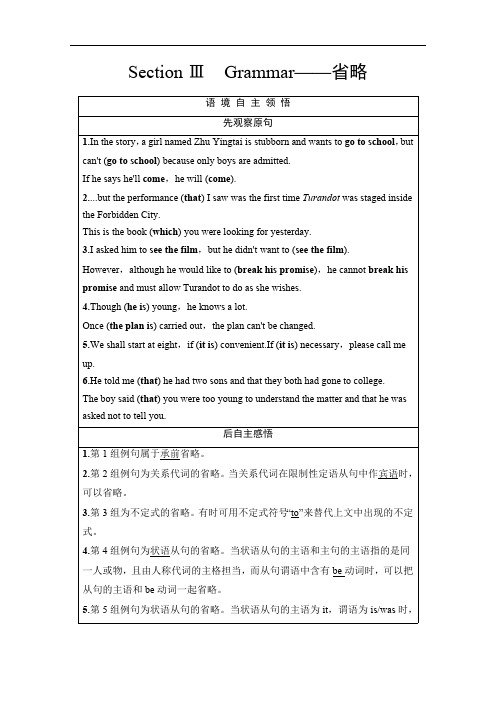
Section Ⅲ Grammar——省略语境自主领悟先观察原句1.In the story,a girl named Zhu Yingtai is stubborn and wants to go to school,but can't (go to school) because only boys are admitted.If he says he'll come,he will (come).2....but the performance (that) I saw was the first time Turandot was staged inside the Forbidden City.This is the book (which) you were looking for yesterday.3.I asked him to see the film,but he didn't want to (see the film).However,although he would like to (break his promise),he cannot break his promise and must allow Turandot to do as she wishes.4.Though (he is) young,he knows a lot.Once (the plan is) carried out,the plan can't be changed.5.We shall start at eight,if (it is) convenient.If (it is) necessary,please call me up.6.He told me (that) he had two sons and that they both had gone to college.The boy said (that) you were too young to understand the matter and that he was asked not to tell you.后自主感悟1.第1组例句属于承前省略。
高二英语省略句在宾语从句中的用法练习题20题含答案解析
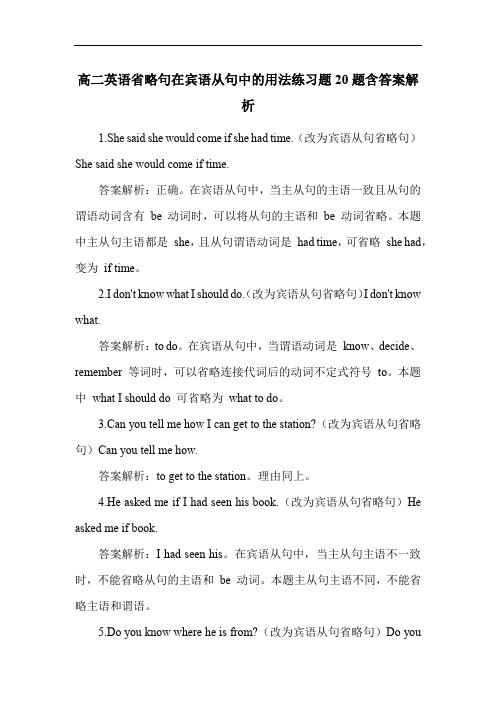
高二英语省略句在宾语从句中的用法练习题20题含答案解析1.She said she would come if she had time.( 改为宾语从句省略句)She said she would come if time.答案解析:正确。
在宾语从句中,当主从句的主语一致且从句的谓语动词含有be 动词时,可以将从句的主语和be 动词省略。
本题中主从句主语都是she,且从句谓语动词是had time,可省略she had,变为if time。
2.I don't know what I should do.( 改为宾语从句省略句)I don't know what.答案解析:to do。
在宾语从句中,当谓语动词是know、decide、remember 等词时,可以省略连接代词后的动词不定式符号to。
本题中what I should do 可省略为what to do。
3.Can you tell me how I can get to the station? 改为宾语从句省略句)Can you tell me how.答案解析:to get to the station。
理由同上。
4.He asked me if I had seen his book. 改为宾语从句省略句)He asked me if book.答案解析:I had seen his。
在宾语从句中,当主从句主语不一致时,不能省略从句的主语和be 动词。
本题主从句主语不同,不能省略主语和谓语。
5.Do you know where he is from? 改为宾语从句省略句)Do youknow where.答案解析:he is from。
在宾语从句中,若疑问词在从句中作主语,语序不变,不能省略。
本题中where 在从句中作from 的宾语,he is from 不能省略。
6.I wonder what his name is.( 改为宾语从句省略句)I wonder what.答案解析:his name is。
江苏省无锡市锡山高级中学2024-2025学年高二上学期10月阶段学情调研数学试题(无答案)
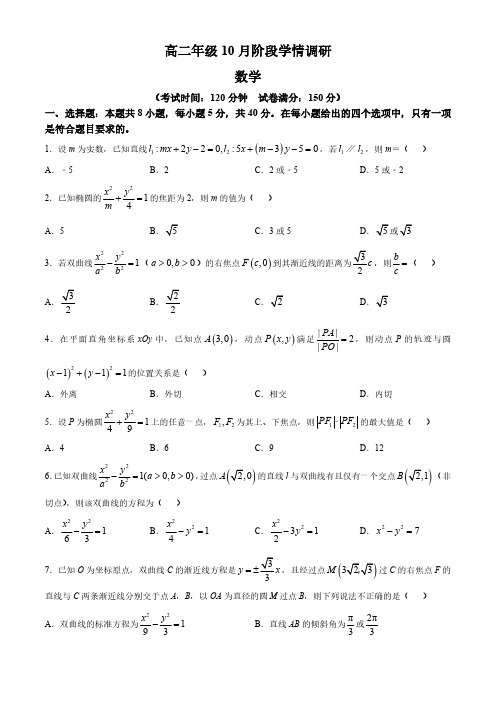
高二年级10月阶段学情调研数学(考试时间:120分钟 试卷满分:150分)一、选择题:本题共8小题,每小题5分,共40分。
在每小题给出的四个选项中,只有一项是符合题目要求的。
1.设m 为实数,已知直线,若,则m =( )A .﹣5B .2C .2或﹣5D .5或﹣22.已知椭圆的的焦距为2,则m 的值为( )A .5BC .3或5D3.若双曲线()的右焦点,则( )ABCD4.在平面直角坐标系xOy 中,已知点,动点满足,则动点P 的轨迹与圆的位置关系是( )A .外离B .外切C .相交D .内切5.设P 为椭圆上的任意一点,为其上、下焦点,则的最大值是( )A .4B .6C .9D .126.已知双曲线,过点的直线l 与双曲线有且仅有一个交点(非切点),则该双曲线的方程为( )A.B .C .D .7.已知O 为坐标原点,双曲线C 的渐近线方程是,且经过点过C 的右焦点F 的直线与C 两条渐近线分别交于点A ,B ,以OA 为直径的圆M 过点B ,则下列说法不正确的是( )A.双曲线的标准方程为B .直线AB 的倾斜角为或()12:220,:5350l mx y l x m y +-=+--=12l l ∥2214x y m +=22221x y a b -=0,0a b >>(),0F c bc=()3,0A (),P x y ||2||PA PO =()()22111x y -+-=22149x y +=12,F F 12PF PF ⋅22221(0,0)x y a b a b-=>>)A)B22163x y -=2214x y -=22312x y -=227x y -=y x =(M 22193x y -=π32π3C .圆M 的面积等于9πD .与的面积之比为2:58.设直线,一束光线从原点O 出发沿射线(x ≥0)向直线l 射出,经l 反射后与x轴交于点M ,再次经x 轴反射后与y 轴交于点N .若k 的值为()A .B .C .D .二、多项选择题:本题共3小题,每小题6分,共18分.在每小题给出的选项中,有多项符合题目要求.全部选对的得6分,部分选对的得部分分,有选错的得0分.9.设是椭圆的两个焦点,P 是椭圆上一点,且,下列说法中正确的是( )A .B .为直角三角形C .的面积为6D .的面积为1210.已知圆,则( )A .圆O 与直线必有两个交点B .圆O 上存在4个点到直线的距离都等于1C .圆O 与圆恰有三条公切线,则m =16D .动点P 在直线上,过点P 向圆O 引两条切线,A 、B 为切点,则四边形PAOB 面积最小值为211.已知为双曲线的左、右焦点,过的直线交双曲线C 的右支于P ,Q 两点,则下列叙述正确的是( )A .直线与直线的斜率之积B .的最小值为C .若,则的周长为D .点P到两条渐近线的距离之三、填空题:本题共3小题,每小题5分,共15分。
高考英语无锡省略句知识点知识点总复习有答案解析
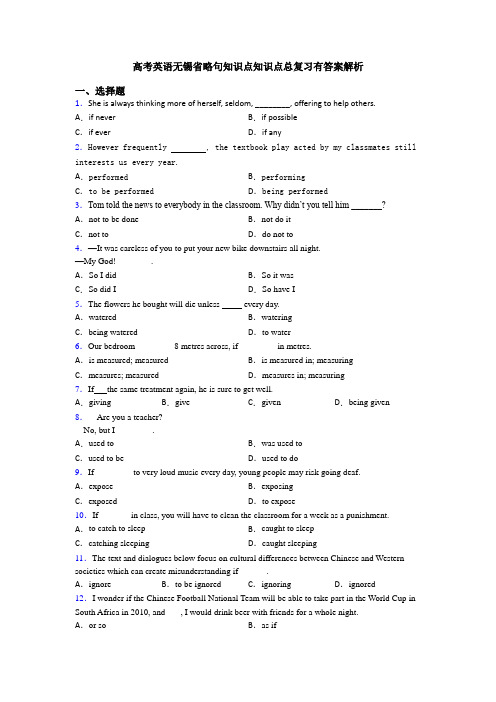
高考英语无锡省略句知识点知识点总复习有答案解析一、选择题1.She is always thinking more of herself, seldom, ________, offering to help others.A.if never B.if possibleC.if ever D.if any2.However frequently , the textbook play acted by my classmates still interests us every year.A.performed B.performingC.to be performed D.being performed3.Tom told the news to everybody in the classroom. Why didn’t you tell him _______?A.not to be done B.not do itC.not to D.do not to4.—It was careless of you to put your new bike downstairs all night.—My God!________.A.So I did B.So it wasC.So did I D.So have I5.The flowers he bought will die unless every day.A.watered B.wateringC.being watered D.to water6.Our bedroom ________ 8 metres across, if ________ in metres.A.is measured; measured B.is measured in; measuring C.measures; measured D.measures in; measuring7.If the same treatment again, he is sure to get well.A.giving B.give C.given D.being given8.---Are you a teacher?---No, but I ________.A.used to B.was used toC.used to be D.used to do9.If ________ to very loud music every day, young people may risk going deaf.A.expose B.exposingC.exposed D.to expose10.If ______ in class, you will have to clean the classroom for a week as a punishment.A.to catch to sleep B.caught to sleepC.catching sleeping D.caught sleeping11.The text and dialogues below focus on cultural differences between Chinese and Western societies which can create misunderstanding if ______.A.ignore B.to be ignored C.ignoring D.ignored12.I wonder if the Chinese Football National Team will be able to take part in the World Cup in South Africa in 2010, and ___, I would drink beer with friends for a whole night.A.or so B.as ifC.even so D.if so13.—Hi, are you a student of this University?—No, but I ________.A.want to B.want to beC.want so D.want it14.He is only too ready to help others, seldom, ____, refusing them when they turn to him. A.if never B.if ever C.if not D.if any15.The director was fully convinced that this moving story, if ______ for television, would be a hit.A.adapted B.being adaptedC.to be adapted D.having been adapted16.--- The weather forecast says it’ll be fine tomorrow.---________, what about going hiking ?A.If possible B.If necessaryC.If so D.If real17.This golden opportunity _____ your full attention although ________ to seize. A.worthy of; is hard B.worth; being hardC.is worthy; it hard D.is worth; hard18.Unless _______ , he kept silent all the time.A.spoken B.being spoken to C.spoken to D.speaking to 19.The cloth ______easily if _______on a table.A.measures, spreading B.will be measured, spread C.measures, spread D.is measured, spread20.Once _______ in the forest, we should remain ________ we are and wait for help. A.losing; there B.losing; where C.lost; there D.lost; where 21.When ________ for his views about his teaching job, Philip said he found it very interesting and rewarding.A.asking B.asked C.to ask D.having asked 22.Although ________ to stop, he kept on workingA.tell B.telling C.having told D.told23.When _______the two countries, we’ve found they have much in common. A.compared B.compare C.being compared D.comparing 24.When deeply ______ in work, he always forgets all about eating or sleeping. A.absorbing B.trapping C.absorbed D.trapped25.A good i nterviewer is able to tell very quickly if you’ve done your homework about the company, so make sure you ________!A.do B.have C.will do D.did【参考答案】***试卷处理标记,请不要删除一、选择题1.C解析:C【解析】试题分析:考查省略结构;A. if never 如果不;B. if possible如果可能;C. if ever 很少,难得;D. if any 如果你有的话。
- 1、下载文档前请自行甄别文档内容的完整性,平台不提供额外的编辑、内容补充、找答案等附加服务。
- 2、"仅部分预览"的文档,不可在线预览部分如存在完整性等问题,可反馈申请退款(可完整预览的文档不适用该条件!)。
- 3、如文档侵犯您的权益,请联系客服反馈,我们会尽快为您处理(人工客服工作时间:9:00-18:30)。
江苏省锡山高级中学高二下英语M8 语法(省略)在英语中,有时为了言简意赅,突出关键词语;有时为了避免重复;有时因为语法的客观要求,句子中的一个或几个不需要表达出来,这种现象称为省略。
英语中的省略原则是既不破坏语法结构,同时又不能产生歧义,要保持句子意义的准确无误。
英语的省略大致有以下几种情况:一、祈使句中的省略:(You)Open the door for me, please. Don’t (you) eat more than what is good for you. 练一练:--- I’m afraid those bags are too heavy for me along the way.--- _____ you forget me! I can give you a hand with them.A.Don’tB. Didn’tC. Won’tD. Can’t二、定语从句中的省略1. 限制性定语从句中作宾语的关系代词that, which, who, whom 可以省略。
Here is the wonderful book (that/ which) I have read many times.He is the last person (that/ who/ whom) I want to talk to.练一练:(1)They talked about an hour of things and persons _____ they remembered in the school.A.whichB. /C. whoD. whom(2) --- Do you have anything to say for yourselves?--- Yes, there’s one point _____ we must insist on.A.whyB. whereC. howD. /2. way (方式、方法) 后接定语从句时关系代词的省略。
I don’t like the way (that/ in which) you speak to your mother.练一练:(1)The way ____ he looks at problems is wrong.A.whichB. whoseC. whatD. /( 2) I don’t like the way ____ is not a bit practical.A.whichB. whoseC. whatD. /三、宾语从句中的省略当一个动词之后有多个宾语从句时,第二(三、、、)个宾语从句的连词that不省略。
He learns that wealth does not buy happiness and that friends are more important than a fancy education.四、相同句型或相同动词的两个分句中使用承前省略。
The ambassador was born in 1961, and his wife (was born) in 1964.练一练:划出下列句中可以承前省略的内容。
(1)Some people spend their lives in search of money, some people spend their lives in search of power, and some people spend their lives in search of happiness.(2)To some life is pleasure, but to others life is suffering.(3)--- We won’t finish the work until next month.--- And they won’t finish the work until next month either.五、不定式中的省略1. 为避免重复,经常对动词不定式进行省略,即省略上下文中已提到的动词,但通常保留不定式符号to; 这类动词有:expect, forget, hope, intend, mean, refuse, try, want, wish, would like, love 等。
练一练:(1)She asked me to dance with her, but I _____________(不想跟她跳舞)。
(2)--- Do you want to give us a lecture about how to use an English dictionary?--- No, I prefer not to give a lecture about how to use an English dictionary. (划出可以省略的部分)(3)--- What’s the matter with Della?--- Well, her parents wouldn’t allow her to go to the party, but she still _____.A. hopes toB. hopes soC. hopes notD. hopes for2. 在have to, need, ought to, be going to, used to 等后省略动词。
I really didn’t want to go there with him, but I ________(不得不去).3. 不定式在happy, glad, eager, ready, willing, afraid, delighted, pleased 等形容词后面作状语时,可以进行省略处理,但要保留不定式符号to。
练一练:--- Will you join in our discussion?--- I’ll be glad to join in your discussion. (划出可以省略的部分)4. 如果不定式中有带有助动词be, have, have been等,通常保留be, have, have been.(1) --- Did the teacher remind the students of the usage?--- No, but they ought to have been reminded of the usage since they are so forgetful. (划出可以省略的部分)(2)In my opinion, life in the twenty-first century is much easier than _____.A. that used to beB. it is used toC. it was used toD. it used to be(3) --- Did Pip feel embarrassed when Joe came to see him?--- Yes, but he ______.A.shouldn’tB. shouldn’t haveC. mustn’tD. mustn’t have5. 介词except, but 后的不定式以及作表语的不定式,如果它们前面出现了行为动词do的任何形式,则后面的不定式常省略to.练一练:(1)The desperate criminal ______________________(别无选择只得向警方投降).换个说法:The desperate criminal _____________________________________.(2) What Pip wants to do is _______(become) a civil gentleman.6. 否定形式的省略用not to.--- Will you go instead of him? --- No, I prefer ______.六、状语从句中的省略:当状语从句中的主语和主句的主语相同,并且从句中使用be动词时,可以省略主语和be动词。
1.when, while, until, once 引导的时间状语从句。
Do be careful while (you are) crossing the street.Once (it is) published, the book will be quite popular.练一练:(1)W hen you are at a party, you should watch your manners. (划出可以省略的部分)(2)T he plan won’t be carried out until it is approved by the city government. (划出可以省略的部分)(3)___________________(当我沿着街往前走时), I heard my name called.2.if, unless 引导的条件状语从句Don’t speak unless you are spoken to. (划出可以省略的部分)The bird, if it is taken good care of, can live as long as five years. (划出可以省略的部分)练一练:(1)D on’t do it unless _______(require) to do it.(2)T he medicine, _________________(如果服用得当), will work well.(3)E very evening after dinner, if not _______ from work, I will spend some time walking my dog.A.being tiredB. tiringC. tiredD. to be tired3.although, though, even if, even though, no matter wh-引导的让步状语从句。
Though he was terribly frightened, he managed to remain calm. (划出可以省略的部分)He couldn’t understand it even though he had been told many times. (划出可以省略的部分) No matter how frequently it is performed, the play still enjoys widespread popularity. (划出可以省略的部分)练一练:(1)T he lawyer rarely wears anything other than jeans and a T-shirt _____ the reason.A.whateverB. whereverC. wheneverD. however(2) The old tower must be saved, _____ the cost.A. howeverB. whateverC. whicheverD. wherever(3) Little Bob remained good and friendly to anybody _______________________(即使受到别的孩子的嘲笑).4. than, as…as 引导的比较状语从句:He did the work far better than he was expected. (划出可以省略的部分)They are as optimistic now as they were optimistic before. (划出可以省略的部分)The math exam was __________________________(比预料的难多了)。
